Those of you who have been following me on Twitter these past few months have no doubt noticed my occasional tweets about the latest episode of The Handmaid’s Tale. This year I decided to combine all of my thoughts on this show into one long post instead of blogging about each episode individually.
The cast of characters for this show is large. As you scroll through my review, you’ll see photos and names of most of them. I did leave out some minor characters in order to avoid giving away spoilers for later developments in this season, but I included nearly everyone who appeared at least semi-regularly in the plot.
There was only one exception for the spoiler-free rule, and it is something I’ll briefly mention in the section underneath Commander Waterford’s picture. I felt the need to include that sentence because the storyline does involve some common topics that some people find triggering.

Elizabeth Moss as June/Offred.
When season one of this show ended last year, Offred discovered she was pregnant shortly before being lead out of the Waterford’s home and into one of the vans that was owned by the Eyes, the government-authorized spies in Gilead. Whether the van was meant to deliver her to a life of freedom in Canada or take her someplace else entirely was left to be seen.
The pursuit – and loss – of freedom was one of the major recurring themes in season two of The Handmaid’s Tale. As a member of a totalitarian society who only valued her for her reproductive capabilities, Offred should have been resigned to the loss of her husband, daughter, and freedom by now.
She wasn’t.
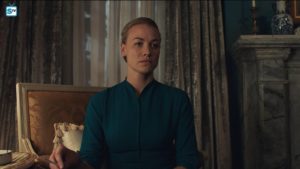
Yvonne Strahovski as Serena Joy Waterford.
Life as a Handmaid in general or with the Waterfords specifically had never been pleasant for Offred.
Since Offred had done it once before, the Waterfords held high hopes that her latest pregnancy would have an equally happy ending. I had strong opinions about the most likely outcome of this pregnancy when season two began.
Offred had something that Serena Joy desperately craved: the ability to conceive and bear a healthy child. The jealousy in this household was palpable, and it only grew stronger as the season progressed. As someone who has never felt the urge to be anyone’s mother, I appreciated the fact that the storyline spent so much time exploring what it means to be a parent and what it feels like when someone is stripped of the ability to decide when, whether, with whom, or how often to reproduce.
While being biologically related to a child can be part of parenthood, this theme was much more complex than who shared DNA with each other. I’d be wandering into spoiler territory if I said much else about this idea, but do pay close attention to how all of the characters on this show react to children and the concept of being a parent in general.
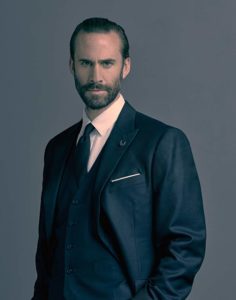
Joseph Fiennes as Commander Waterford.
Speaking of Commander Waterford, I liked the fact that this season spent so much time exploring how a man who claimed to be doing God’s work could authorize so many things that no loving deity would ever command anyone to do. He was also one of the least paternal characters I’ve ever known.
If you need a trigger warning for rape or abuse, know that these are two of the many horrible things this character does in the second season. This is all I will say on this topic, but I would be happy to privately go into more detail for anyone who needs to know what to expect ahead of time.
The thought of Commander Waterford possibly raising a baby was a frightening as it was bizarre. He seemed to have no interest in children outside of their ability to elevate his status in society, and that’s never a good reason for anyone to have a child.
The tension between the wholesome image this character wanted to project to his neighbours and who he genuinely was when the doors were closed was as frightening as it was thought-provoking. Anyone might notice slight discrepancies between who they would ideally like to be and who they actually were, but when the gap between the two is this gigantic it becomes impossible to ignore.

Amanda Brugel (left) as Martha.
This is even more true for people who interacted with Commander Waterford on a daily basis.
I appreciated the fact that Martha, the cook/housekeeper, was given extra screen time in season two. Her character shared enough tidbits in season one from her previous life – including the fact that she had a son who died in the civil war – that I was hoping we’d learn more about what sort of person she was.
As is often the case with secondary characters in this series, I didn’t get as many details about Martha as I would have liked to receive. There simply wasn’t enough time to tell me everything I wanted to know about this character, but my appetite has been whetted for more. I hope she gets even more attention in season three.
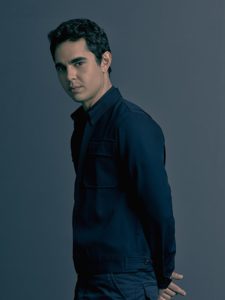
Max Minghella as Nick.
Nick, the Waterford’s driver, Guardian (bodyguard), and biological father of June’s baby, did get his fair share of development, however. Based on the way he behaved in season one, I was not at all prepared for what would happen to him in season two. It was really nice to dive into this character’s point of view so deeply, especially once certain things began happening that he hadn’t planned for or desired.
Honestly, he wasn’t someone I liked or trusted all the much in the first season. Throwing Nick into situations he found unnerving was the best possible thing that could have happened to him. I learned so much about his moral code and what he wanted out of life based on his reactions to all of the life changes that Gilead thrust upon him.
Yes, I know I’m being quite vague in this section. It’s something I’m doing on purpose in order to avoid sharing a major plot twist from one of the early episodes of season two. Just know that Nick’s life is about to be turned upside down in season two if you’ve just begun watching it.

Ann Dowd as Aunt Lydia.
Aunt Lydia was as insufferable as ever.
When I first met her in season one, I couldn’t tell if this character was a true believer in the unbearably strict religious mores of Gilead or if she’d always been a sadist. The things she did to the handmaids she trained and kept in line were disturbing on a good day.
When she felt threatened or like her handmaid’s weren’t being obedient, Aunt Lydia was quick to slide past disturbing and into much darker corners of the human mind. I can’t imagine mistreating anyone the way she did, so it was hard to understand where she was coming from.
Other than Martha, Aunt Lydia is the character I’d like to see fleshed out the most in season three. The audience had so little information about what makes this villain tick that her violent choices only lowered my opinion of her more this season.

Alexis Bledel as Emily/Ofglen.
Offred wasn’t the only Handmaid in this society. Some of the most memorable scenes this year explored the fates of the other Handmaids in Gilead. None of them could be said to be having a positive experience, but certain ones were treated worse than others.
Emily/Ofglen’s fate was of particular interest to me due to how much I could relate to her as a fellow member of the LGBT community and lover of knowledge. In a slightly different set of circumstances, I could have easily walked a mile in her shoes. That’s frightening.

Madeline Brewer as Janine/Ofwarren.
Janine was another Handmaid whose storyline was developed nicely in season two. Once again, I can’t say a great deal about her life with giving away spoilers, but I did find it interesting to see how someone as fragile and emotionally unwell as this character has managed to stay alive in a society where either of those “flaws” could so easily lead to a quick death for anyone unlucky enough to develop them.
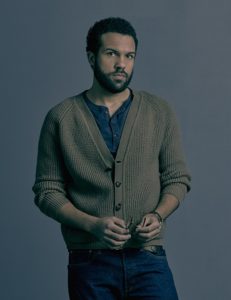
O.T. Fagbenle as Luke, June’s husband.
One of the things that first pulled me into this book before it became a TV series was June’s relationship with her husband.
The Luke in the book annoyed me in the beginning due to his unwillingness to empathize with June’s fears about living in a society where women were so quickly losing their rights and his stubborn determination to ignore every red flag until it was too late for him to get his family out of the country safely. I didn’t blame him for failing to understand what it’s like to be a woman. However, I did blame him for refusing to take his wife seriously when she opened up to him about how women were really being treated.
Getting to know a little more about the assumptions Luke made about others helped me to understand why he messed up so terribly in the beginning. I still wish he’d listened to his wife the first time she shared her concerns with him, though!

Jordana Blake (left) as Hannah Bankole, daughter of June and Luke.
There is very little I can say about Hannah without giving away spoilers, but her emotional bond with both of her parents has been a beautiful part of the plot since the first scene of season one. June’s second pregnancy was made even more poignant because she’d already had years of parenting experience under her belt. She knew exactly what it was she was going to be giving up after her pregnancy ended and she was moved on to the next childless household.
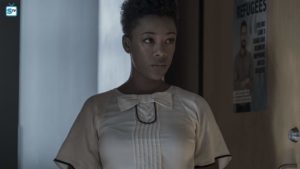
Samira Wiley as Moira.
I do wish Moira had been given more opportunities to shine in season two. We got to know her so well in the first season that I would have relished the opportunity to see how she was adjusting to life outside of Gilead after her daring escape at the end of season one.
Only time will tell if season three dig more deeply into the lives of Moira, Martha, and Aunt Lydia.
If you’re a fellow fan of The Handmaid’s Tale, what did you enjoy the most about season two?
